
"Turn Back Time" is a song by Danish dance-pop group Aqua, released as their seventh single overall, and the sixth from their debut album, Aquarium (1997). The song was also included on the soundtrack for the 1998 film Sliding Doors, starring Gwyneth Paltrow, and was released across the world throughout 1998, starting with the United States in January. The track possesses less of a bubble pop sound than Aqua's other releases; it is slow-paced and shows the full range of Lene Nystrøm's vocals but maintains the Aqua sound. In Japan, "Turn Back Time" was released along with "My Oh My". "Turn Back Time" was successful on the charts on several countries, becoming Aqua's third consecutive number one on the UK Singles Chart.

Flex is the second studio album by English-American singer-songwriter Lene Lovich, released in January 1980 by Stiff Records. The album is produced by Lovich and Les Chappell with additional production by Roger Bechirian and Alan Winstanley. It was recorded at the Wisseloord Studios in Hilversum, Netherlands. She worked with Chappell and Judge Smith on writing the songs.
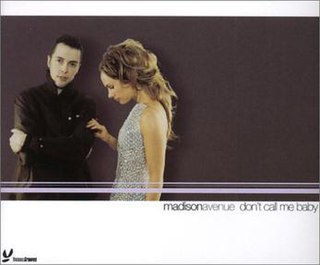
"Don't Call Me Baby" is a song by Australian house music duo Madison Avenue, released as the first single from their only studio album, The Polyester Embassy (2000). Written by Cheyne Coates, Andy Van Dorsselaer, Duane Morrison, and Giuseppe Chierchia, the song includes a bassline sample from "Ma Quale Idea" by Italo disco artist Pino D'Angiò, which in turn is based on "Ain't No Stoppin' Us Now" by McFadden & Whitehead.

"Try" is a song by Canadian singer-songwriter Nelly Furtado, taken from her second studio album, Folklore (2003). The song, written by Furtado herself, and Brian West, was released as the second single from the album in February 2004. The song was moderately successful in several European countries, including Italy, the Netherlands, and the United Kingdom, where it reached the top 20. It did not chart on the US Billboard Hot 100, but it did peak at number 29 on the Adult Top 40 chart.

"Sitting Down Here" is a song written by Norwegian singer-songwriter Lene Marlin for Marlin's 1999 debut album, Playing My Game. The song is the album's opening track and was released as its second single in February 1999, peaking at number two on the Norwegian Singles Chart. It also peaked within the top 10 in Finland, Hungary, Italy, the Netherlands, New Zealand, and the United Kingdom. The song is certified gold in Norway and the United Kingdom.
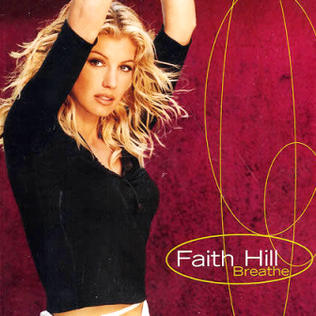
"Breathe" is a song written by Stephanie Bentley and Holly Lamar and recorded by American country music artist Faith Hill. Warner Bros. Records released it on October 4, 1999, as the first single from Hill's fourth album of the same name (1999). The song was produced by Byron Gallimore and Hill. "Breathe" became Hill's seventh number one on the Hot Country Songs chart in the United States, spending six weeks at number one. It also peaked at number two on the Billboard Hot 100 chart in April 2000. Despite not peaking at number one, it was the number-one single of 2000.
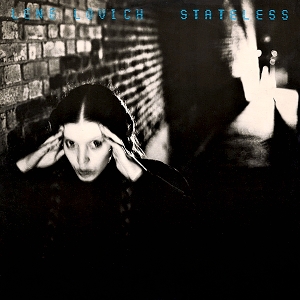
Stateless is the debut studio album by English-American singer Lene Lovich. It was released in October 1978 by Stiff Records and produced by Lene Lovich and Les Chappell.

"Oh Yeah" is a song by Northern Irish rock band Ash, released as the fifth single from their debut studio album, 1977 (1996), on 24 June 1996. It was released on CD, 7-inch vinyl, and cassette formats. Upon its release, "Oh Yeah" debuted and peaked at number six on the UK Singles Chart, becoming Ash's second-highest-charting single on the chart following their previous release, "Goldfinger".

"I Think We're Alone Now" is a song written and composed by Ritchie Cordell that was first recorded by Tommy James and the Shondells. It was a major hit for the group, reaching number 4 on the US Hot 100 in April 1967. It finished at No. 12 on Billboard magazine's year-end singles chart for 1967.

New Toy is the first extended play by English-American singer-songwriter Lene Lovich released in 1981 by Stiff Records. It was released outside the United Kingdom in three different versions, one featured six new songs, while the other two contained songs from her previous albums, Stateless (1978) and Flex (1979).
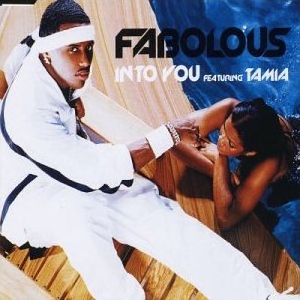
"Into You" is the third single from American rapper Fabolous's second studio album, Street Dreams (2003), featuring either Ashanti or Tamia. The song also appears on Tamia's album More. "Into You" originally featured Ashanti, but after Irv Gotti of Murder Inc. Records refused to let her film a music video to promote the single, Fabolous reached out to Tamia to re-record a commercial version. Both the album and single versions received heavy radio-play, resulting in all three artists being credited on the US Billboard Hot 100. The single was released through Elektra Records and DJ Clue's Desert Storm Records.
"Kingston Town" is a 1970 song by Lord Creator released as a single on producer Clancy Eccles' Clandisc label. It was also recorded in 1989 by reggae group UB40 and was released as the second single from their album Labour of Love II, reaching number four on the UK Singles Chart and number one in France and the Netherlands.

March is the fourth studio album by English-American singer-songwriter Lene Lovich, released in October 1989 by Pathfinder Records. It was her first new full-length album since No Man's Land (1982) and also the last album before her 15-year hiatus and the release of Shadows and Dust (2005). The album is entirely produced by Lovich and Les Chappell. They also wrote all the songs on the album, except for "Wonderland", which was co-written by Andy Scott and Chris Bradford. It was recorded in Norfolk, England.

"The Ballad of Tom Jones" is a song by English band Space and Cerys Matthews, lead singer of Welsh band Catatonia. Lead singer Tommy Scott described Tom Jones as 'brilliant'. The song became a highly successful radio single, and resulted in Space performing with Jones in Jools Holland's' New Year's Eve television programme.
"Are You Ready for Love" is a song recorded by English musician Elton John in 1977 and first released in the UK in 1979 as the first single from the EP The Thom Bell Sessions. It was written by LeRoy Bell, Thom Bell and Casey James, and was originally produced in Philadelphia by Thom Bell, who had already produced a series of hits for the Spinners, the Delfonics and the Stylistics. While the song "Mama Can't Buy You Love" from the EP charted in 1979, this song and the other track on the three-track 12-inch vinyl disc, "Three Way Love Affair", were only minor footnotes at the time. The song originally peaked at number 42 on the UK Single Charts in 1979.

"Can You Dig It?" is a 1991 single by English indie rock band the Mock Turtles that was featured on their 1990 album, Turtle Soup. It was originally the B-side to the song "Lay Me Down". It was released on Siren Records in all formats except for one of the seven-inch singles released in Europe where it was released by Virgin Records.
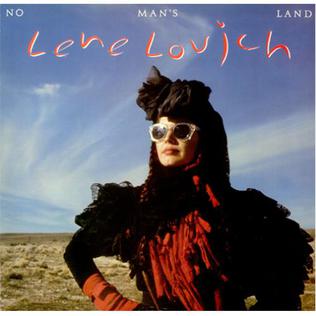
No Man's Land is the third studio album by Lene Lovich, released on 12 November 1982 by Stiff Records. It is her last album to be released on the Stiff Records label. The album is produced by Lovich and Les Chappell. It contains songs from her previously released extended play, New Toy, since the album was planned to be already released in 1981, but was postponed following the disagreements with the record company.

Lene Lovich is an American-English singer, songwriter and musician. She first gained attention in 1979 with the release of her hit single "Lucky Number", which peaked at number 3 on the UK Singles Chart and made her a leading figure of the new wave music scene.
"Bird Song", is a 1979 song written by Lene Lovich and Les Chappell, released as a single by Lene Lovich, from the album Flex. It charted at 39 in the UK.

















